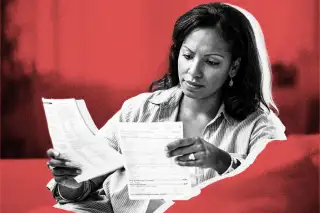Why You Should Think Twice Before Requesting a Paycheck Advance

Paycheck advance programs give workers instant access to their wages, with no need to wait for a bank deposit. But officials warn advances are essentially just loans that come with surprisingly high interest rates — often over 100%.
On Thursday, the Consumer Financial Protection Bureau (CFPB) proposed a rule to officially classify paycheck advance products as consumer loans, which would have implications related to required disclosures under the Truth in Lending Act.
Offered by many employers in partnership with third-party companies like DailyPay, paycheck advances can give workers near-immediate access to the wages they earn, usually by initiating a request online. The advance amount and any fees are then deducted from the worker’s paycheck.
CFPB Director Rohit Chopra said paycheck advance programs are beneficial to employers but not necessarily employees. He said Americans who use these services can easily end up in a cycle of debt.
“The CFPB's actions will help workers know what they are getting with these products and prevent race-to-the-bottom business practices,” Chopra said in a release.
Paycheck advances are loans, CFPB says
When paycheck advance services are offered by employers, there's typically a free option and a fee-based option. But the fee is generally required for workers who want to get their funds as quickly as possible.
Paycheck advances can be a way for workers to get through an emergency or avoid a late bill payment. The advances can get workers their money much faster than waiting for a paycheck. In some cases, the services advertise "same-day pay."
However, the CFPB says that many workers become dependent on these products. The fees average $3.18 per advance, which may seem trivial, but that can add up for people who get advances every week or multiple times per week. “Workers using these employer-sponsored products take out an average of 27 such loans per year,” the release said.
That’s based on a study that included data provided by a group of paycheck advance companies that partner with employers. The list includes AnyDay, Branch, DailyPay, Immediate, OrbisPay and Rain and represents nearly half of the market. These companies work with many large employers in the U.S. in industries including retail and restaurants, such as Target and Domino’s.
Paycheck advances vs. payday loans
The CFPB’s action on employer-sponsored paycheck advance programs follows previous efforts to crack down on exploitative payday loan products, which have a reputation for high interest rates and are illegal in more than 20 states, the CFPB said.
The typical APR for an employer paycheck advance program isn't as bad as the typical APR for a payday loan, but it's still much worse than the interest charged on credit cards balances, the CFPB said. The typical APR for a 10-day paycheck advance comes out to 109.5% (assuming the average advance amount of $106 and $3.18 of fees). Last year, the average credit card APR was around 23%.
If the CFPB's proposed rule goes into effect, paycheck advance lenders will be required to disclose that interest rate for the loan. The CFPB also said it will “not hesitate to take enforcement actions” against paycheck advance companies that break the rules.
More from Money:
5 Tricks to Get More From Your Paycheck This Year
Your Next Credit Card Might Be Metal With Flashing LED Lights